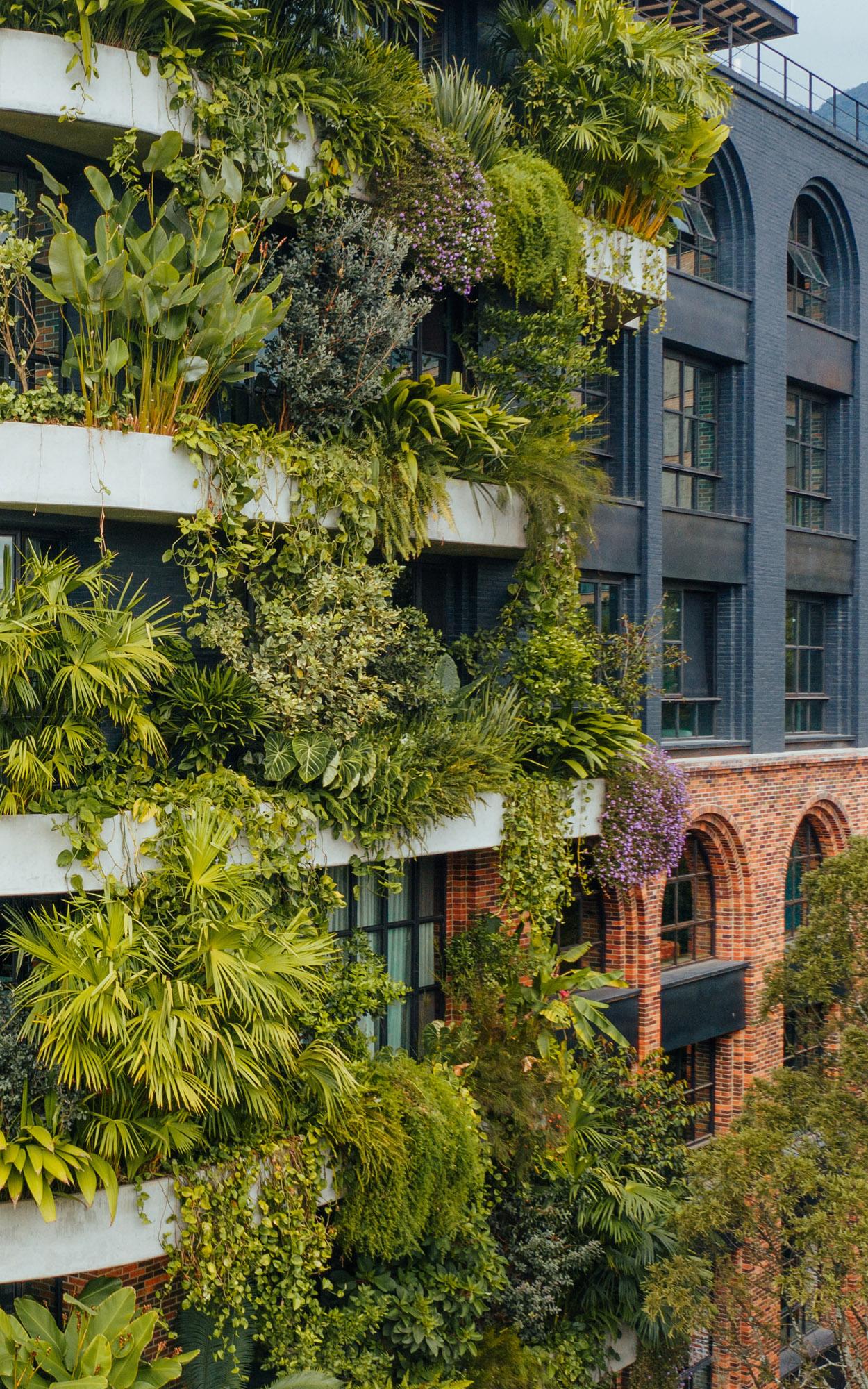Catch the BUZZ September Edition
Vertical gardens of the Provenza Arriba residential apartment block in Medellin, designed by ALH Taller.
Happy children, ecomimicry, Medellin, wetlands and the 2030 biodiversity goals. What do all these things have in common? They feature in the latest edition of the CitiesWithNature Buzz, of course! Don’t miss the latest roundup of urban nature news, opportunities and events from around the world in the September edition.
Also read about Freetown’s innovative tree planting, Barcelona’s toolkit for urban green justice, a new online learning platform for African cities, Melbourne’s resilience strategy, the Cities4Forests call to action and more.
Have you already joined CitiesWithNature as a city or partner organisation? Feature your urban nature news in the Buzz by submitting a short piece and a link via this Google Form.
You can also delve into past issues of the BUZZ where you will find various valuable reports and resources on Nature-based Solutions, urban biodiversity and more. See the past issues here.
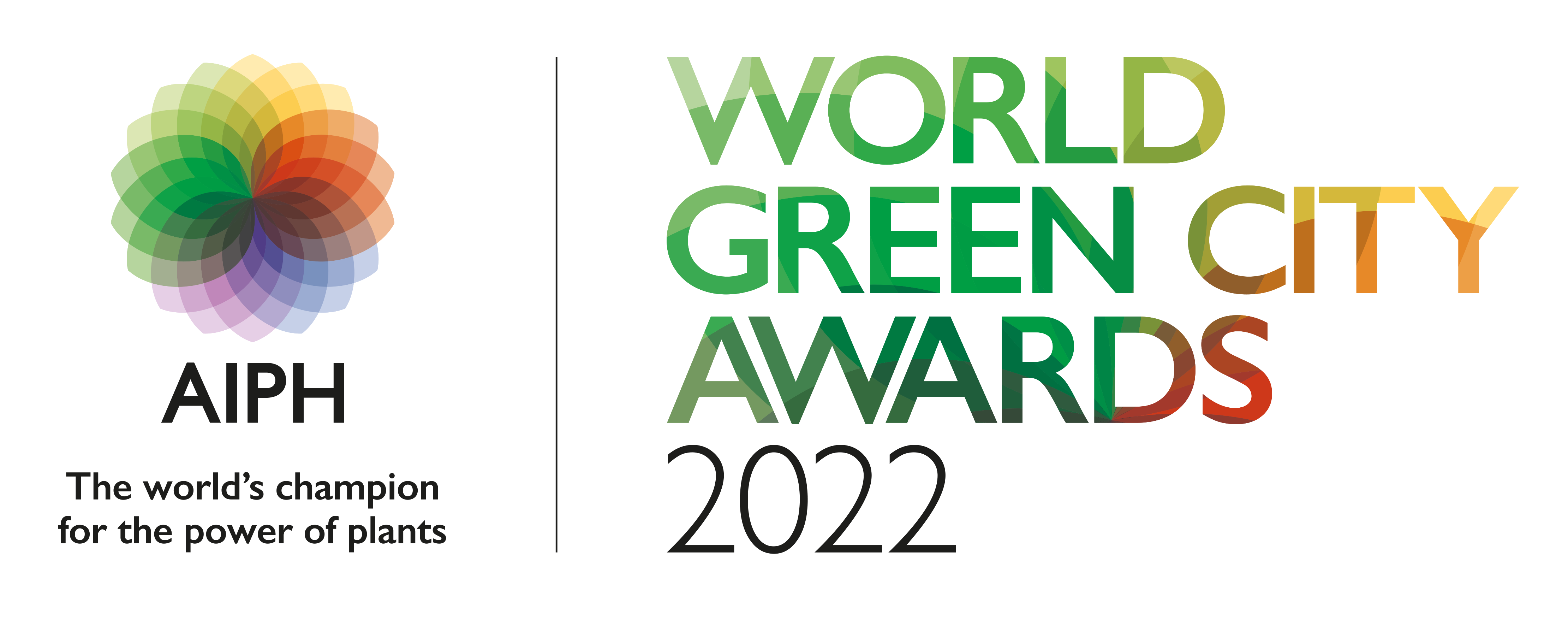
AIPH, the International Association of Horticultural Producers and the world’s champion for the power of plants proudly presents the AIPH World Green City Awards, which recently opened for entries for the 2022 inaugural edition.
AIPH invites all cities, large and small, to showcase their ambitious actions by entering the 2022 edition of the AIPH World Green City Awards.
The leading role of city authorities is recognised for promoting and supporting greater inclusion of nature and plants in urban environments. The AIPH World Green City Awards 2022 are designed to champion ambitious nature-orientated approaches to city design and operation. Specifically, they seek to recognise public initiatives relying on a greater use of plants and nature to create better city environments – helping to fulfil local aspirations for improved economic, social and environmental resilience.
The awards celebrate innovation, achievement, and commitment to the globally recognised imperative to embrace a nature-orientated solutions that harvest the power of plants and associated ecosystem services to help address the major challenges facing cities today – or tomorrow. AIPH initiated these awards to bring wide recognition to the value of plants in providing solutions for common city problems and to create an enabling environment to shape and nurture a strategic shift in city governance and planning.

UrbanByNature webinar series explores Nature-based Solutions in China
On 18 August, UrbanByNature China will host a webinar exploring the enabling conditions and barriers to implementing nature-based solutions, featuring experts from China and the Connecting Nature and CLEVER Cities initiatives.
Speakers will include:
- Stuart Connop, Senior Research Fellow, Sustainability Research Institute, University of East London, UK
- Nian She, Tsinghua University Innovation Center in Zhuhai, China
- Carolina García Madruga, Senior Researcher in Sustainability and Urban Regeneration, Tecnalia, Spain
- Sean Bradley, CLEVER Cities Programme Manager, Groundwork London, UK
- Taoran Guo, Forest City Studio, Shanghai, China
The webinar will be moderated by Chuntao Yang, Program Officer at ICLEI East Asia Secretariat Beijing Office and simultaneous translation (English and Chinese) will be provided.
Tune in on Wednesday 18 August, 9:00 CEST/ 15:00 BJT/CST
You can attend this exciting webinar by registering here.
Find out more about the webinar series here.
What is UrbanByNature?
UrbanByNature is an expertise-sharing and capacity-building programme to empower local governments all around the world to harness the boundless potential of nature for sustainable urban development.
Fuelled by science-supported implementation of nature-based solutions, UrbanByNature offers support to cities as they embark on the journey to becoming CitiesWithNature. The programme aims to bring together established and aspiring urban nature pioneers from local governments, civil society and businesses to co-create a nature-based, sustainable and resilient urban future.
UrbanByNature is hosted by the CitiesWithNature platform and has successfully been launched in Brazil, South Korea and the Caucasus as part of the Horizon 2020 project Connecting Nature.
Learn more about the UrbanByNature Programme here.
We are happy to share that 8 80 Cities is now collaborating with CitiesWithNature to make cities around the world greener, healthier and happier places for young and old. CitiesWithNature is a unique initiative that recognizes and enhances the value of nature in and around cities across the world. It provides a shared platform for cities and their partners to engage and connect, working with a shared commitment towards a more sustainable urban world. 8 80 Cities is joining other leading partners of the CitiesWithNature initiative such as WWF, UNEP, IUCN, Cities4Forests and World Urban Parks.
On the CitiesWithNature platform, cities can embark on a journey to reconnect their communities to nature. Cities can showcase their nature projects on their city profiles, access over 200 cutting-edge tools and resources from partners on the Tools and Resources Hub, use the robust framework of the Nature Pathway to mainstream nature in their cities, connect with partner organizations, and more. Joining CitiesWithNature is free. Representatives from city governments can do so on the website or by writing to info@citieswithnature.org. Not part of a local or subnational government? You can still access various benefits on the website and subscribe for free to the CitiesWithNature Buzz, a monthly round-up of urban nature news and events from around the world.
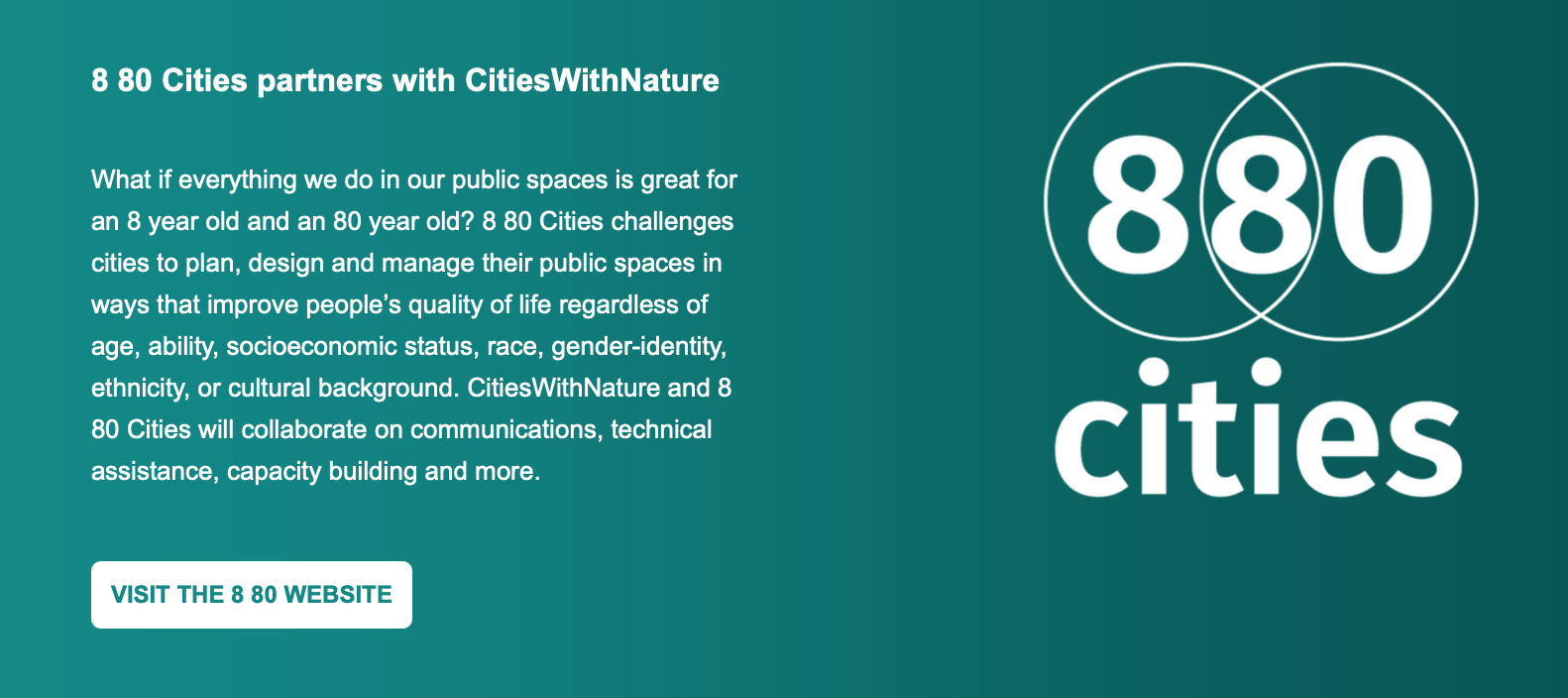
CitiesWithNature is in the spotlight in Australia, where ICLEI Oceania kicked off its new CitiesWithNature webinar series on 14 July with a session targeted at Elected Members of city councils. It aimed to raise councillors’ awareness of the importance of embedding Nature and Biodiversity in all city plans to boost the health and liveability of their communities.
Image: Creek Heroes, City of Onkaparinga
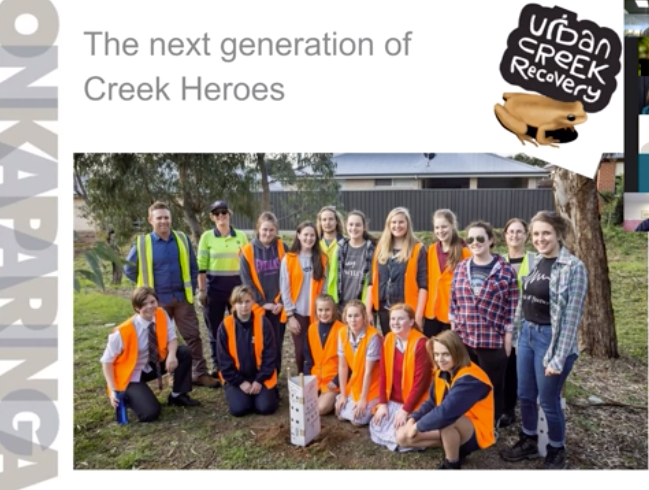
The webinar heard from Prof Niki Frantzeskaki of Swinburne University about the many dimensions of nature-based solutions and how they interface with climate, socio-economic and socio-cultural systems. This was followed by three stories from Australian cities:
- Biolink and Woody Meadow projects in Port Phillip
- Creek Recovery Campaign and Creek Heroes in Onkaparinga
- Living With the Bush and Keep Cats Safe At Home initiatives in the Blue Mountains.
And finally they learnt about the Living Melbourne initiative which is delivering an integrated Urban Forest Strategy across the 32 municipalities of Greater Melbourne.
“Local Government is where great work is being done to re-introduce Nature to our cities” said ICLEI Chair and webinar moderator Cr Amanda Stone. “It was inspiring to hear directly from councillors about innovative projects in their cities.”
This was just the first of a series of webinars on CitiesWithNature to be held by ICLEI Oceania this year. In August there will be a focus group webinar for cities which have participated in the ICLEI-Swinburne needs-assessment research interviews (participants only), and in September there will be a special webinar dedicated to Indigenous Land Management and how this can be applied in urban areas (open to all)
Keep an eye on the CWN Oceania website here for updates.
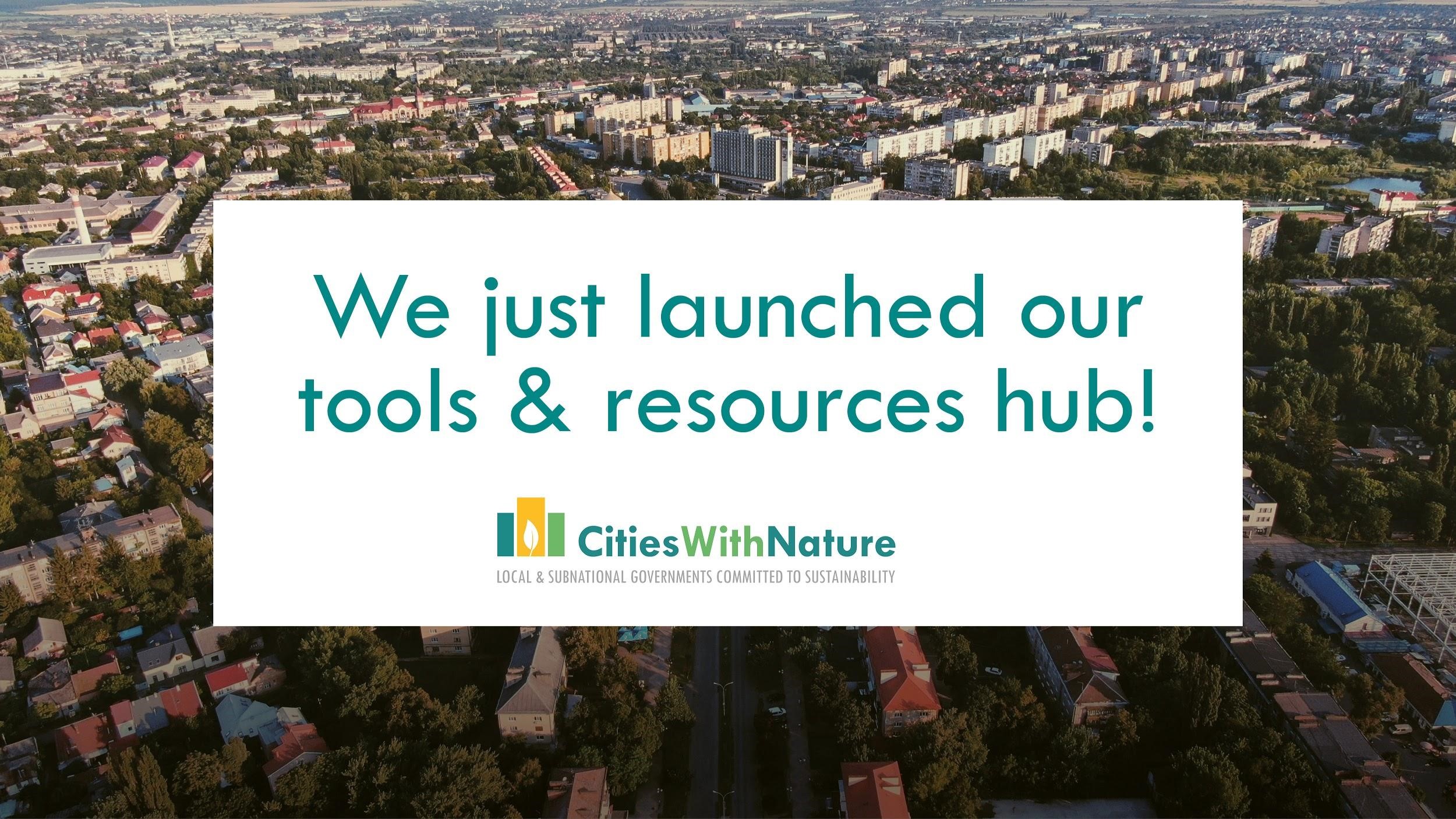
We just launched the Tools and Resources Hub. This new functionality on the CitiesWithNature platform offers a wide range of reliable resources and cutting-edge tools on biodiversity, nature-based solutions, ecosystem restoration, and more. Local and subnational governments signed up to CitiesWithNature have access to all functions of this database, but anyone can browse, learn and be empowered to act for nature in and around their cities.
Over 200+ carefully curated tools and resources are already available on the hub, and the database will grow further as more tools and resources from ICLEI Regional Offices, partner organisations and cities are added. Local and subnational governments that are signed up to CitiesWithNature are able to upload and share their own tools and resources on the hub. As the hub aims to offer tools and resources that are globally, regionally and/or locally relevant, please upload and share your tools and resources, or if you have not yet joined CitiesWithNature let us know about tools and resources that you specifically would like to see on the hub. All tools and resources shared should be available in the public domain and have an associated weblink that can be used to upload it.
Cities need to make many choices on a daily basis. The new CitiesWithNature Tools & Resources library is a place where they can find useful and up to date information, practical tools and guidance that will help them make those choices.
– Amanda Stone, Yarra City Council, Australia

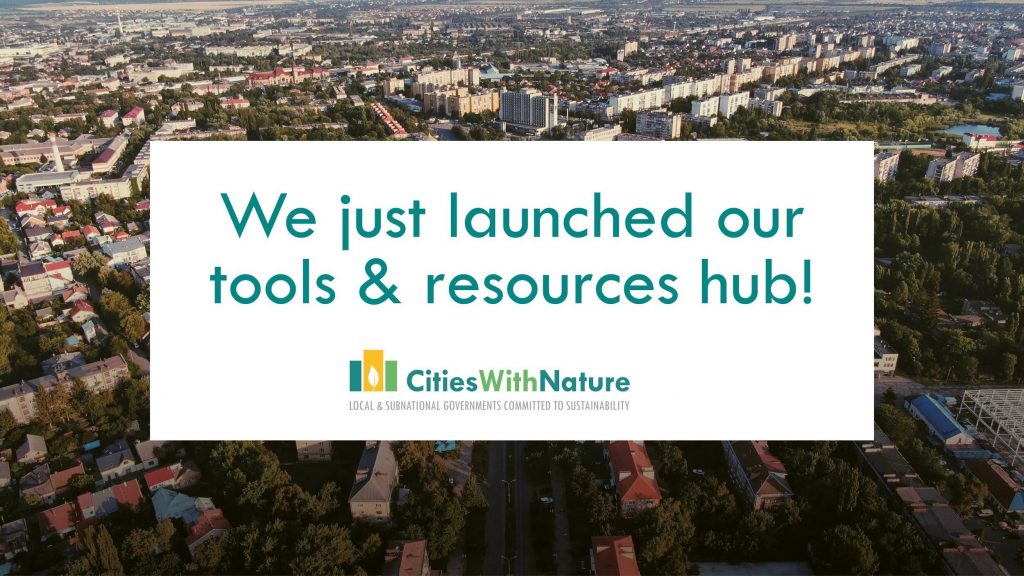
Introduction
What is the Tools and Resources Hub?
The Tools and Resources Hub is now live on the CitiesWithNature website.
We are excited to share that the Tools and Resources Hub of CitiesWithNature was launched early July! This new functionality on the CitiesWithNature platform offers a wide range of reliable resources and cutting-edge tools on biodiversity, nature-based solutions, ecosystem restoration, and more. Local and subnational governments signed up to CitiesWithNature have access to all functions of this database, but anyone can browse, learn and be empowered to act for nature in and around their cities.
Over 200+ carefully curated tools and resources are already available on the hub, and the database will grow further as more tools and resources from ICLEI Regional Offices, partner organisations and cities are added. Local and subnational governments that are signed up to CitiesWithNature are able to upload and share their own tools and resources on the hub. As the hub aims to offer tools and resources that are globally, regionally and/or locally relevant, please upload and share your tools and resources, or if you have not yet joined CitiesWithNature let us know about tools and resources that you specifically would like to see on the hub. All tools and resources shared should be available in the public domain and have an associated weblink that can be used to upload it.
Cities need to make many choices on a daily basis. The new CitiesWithNature Tools & Resources library is a place where they can find useful and up to date information, practical tools and guidance that will help them make those choices.
– Amanda Stone, Yarra City Council, Australia
How Does it Work?
You can access the Tools and Resources Hub even if you are not registered on CitiesWithNature yet. If you are a city, and have signed up, you can access the Tools and Resources Hub and also upload your own.
To access the Tools and resources Hub, you should go to the CitiesWithNature website and click on the MORE button, which is located in the menu bar at the top of your screen. Once you click on MORE, a drop-down will be made available and you will see ‘Tools and Resources Hub’ as part of the drop-down list. You can click here to access the hub.
Once you are in the Hub, you will be able to browse and engage with 200+ Tools and Resources that have been uploaded. Each tool/ resource provides you with a link to the downloadable PDF version.
If you are a registered city, you can login to your account and browse, engage or upload your own resource.
If you would like to upload one of your own tools or resources, you may click on the “upload a resource tab” and follow the steps provided on the website and fill in the required information.

Want to know more?
If you have any queries about the Tools and Resources Hub or another aspect of CitiesWithNature, please let us know and we would be glad to assist. Thank you very much for your support and involvement in CitiesWithNature.
Over the past two decades, ICLEI, through its Cities Biodiversity Center (CBC), has worked closely with the United Nations Secretariat of the Convention on Biological Diversity (CBD) and a range of partners to elevate the voice of local and subnational governments and ensure that strong action is taken to create vibrant cities and regions, where people and biodiversity can thrive.
Taking urgent action for nature
Nature underpins our livelihoods and very existence. It is integral to the effective functioning and well-being of urban communities. This has never been more evident than during the COVID-19 lockdowns. Access to natural open spaces (such as parks, forests, mountains and beaches) was, and in many instances remains, limited and food systems have suffered extreme stress, sometimes even breaking.
Urgent collective global action is needed to reconnect people with nature, protect biodiversity and restore ecosystems. If we do not make peace with nature now – in this decade – the scientific indications are that there will be irreversible tipping points that, once reached, will cause irreparable damage to the critical ecosystems that sustain life on earth.
The escalating decline in biodiversity and associated multiple ecosystem goods and services has implications for the quality of life of current and future generations, adversely limiting our ability to combat poverty, hunger and climate change. More than 37 400 species are at threat of extinction – 28% of all known species.[1] And extinction rates are rising rapidly with predicted future extinctions 10 times higher than they are now. This will significantly negatively affect future generations’ ability to meet their needs. This threat is compounded by the COVID-19 pandemic and climate change, with the former estimated to push as many as 150 million people into extreme poverty this year, and the latter 132 million people by 2030.[2]
Everyone must act quickly to stop biodiversity loss. Oliver Hillel, Programme Officer: Secretariat of the CBD, notes that globally people’s health and well-being, livelihoods and economies depend on biodiversity. “Biodiversity is also the cheapest provider of clean water and air, energy and resilience against climate change,” he says. The Dasgupta Review illustrates that the social benefits of expanding Protected Areas are likely to be significant. A partial economic analysis, focused on forests and mangroves, indicated projected overall benefits of US$170-534 billion a year by 2050.[3] Of this, US$490 billion would originate from avoided flooding, climate change impacts, soil loss and coastal storm damage. These benefits are weighed against the direct investment needed to expand Protected Areas on land and sea, estimated at US$103-178 billion a year by 2030”.[4]
Local and subnational governments – particularly cities, as they plan, coordinate, regulate, monitor and enforce patterns of production and consumption – will need to deliver on as many as two-thirds of the biodiversity targets set out in the Post-2020 Global Biodiversity Framework.
Focusing on biodiversity in the city and regional context
Cities are projected to be home to 75% of the world’s population by 2050.[5] Land-use decisions in the urban landscape related to infrastructure (spatial development), related regulations (emissions, pollution, waste disposal) and by-laws determine to a significant degree societies’ impact on the natural landscape. Cities make these decisions by the thousands each day, often with irreversible consequences. Kobie Brand, Global Director of ICLEI’s CBC, notes that “these impacts are not contained to city boundaries, but can negatively impact the quality of air, soil, water and livelihood options much further afield”.
It is regional and city governments that are best placed to understand and act upon the opportunities and constraints for systemic change within their portfolios. And it is therefore important that their voices and insights are heard on international platforms that are focused on issues of global significance. ICLEI works to elevate the collective voice of local and subnational governments in the United Nations Conventions, such as the CBD, which focuses on conserving biological diversity and sustainable, fair and equitable benefit sharing from its use.
“We deepened our focus on biodiversity in the city and regional context in 2006,” says Brand. At the ICLEI World Congress, ICLEI, in partnership with the International Union for Conservation of Nature’s (IUCN), launched the pioneering global Local Action for Biodiversity (LAB) Programme, highlighting the importance of local biodiversity action.
Launching a dedicated global center and creating platforms for peer exchange and learning
LAB was a world-first initiative developed in response to a request from the City of Cape Town and Ethekwini Municipality in South Africa and the City of Edmonton in Canada for an enhanced focus on biodiversity action at the local level. This exciting pilot project initially worked with 21 pioneer cities of varying sizes and capacity to assess and mainstream biodiversity, as well as identify the value that biodiversity assets provided the city and its citizens. LAB soon expanded to connect and support more than 50 committed cities from around the world. The themes of the LAB Programme were expanded in its second phase to include linkages between biodiversity and climate change, communication, education and public awareness.
ICLEI adopted LAB as its global biodiversity programme and granted ICLEI Africa approval to host a global biodiversity centre in 2008. ICLEI officially launched the CBC in 2010. With ICLEI offices across the globe and a range of local and global partners and stakeholders, ICLEI CBC supports cities and regions in finding and implementing innovative institutional and on-the-ground solutions to reclaim, restore and protect biodiversity. It also ensures that the voices of local and subnational governments are heard in global processes.
Biodiversity action and nature-based development have been mainstreamed as one of ICLEI’s five integrated pathways in its ICLEI Malmö Commitment and Strategic Vision 2021-2027. Through the dedicated commitment of, and collaboration with, ICLEI’s Regional Offices and its World Secretariat, ICLEI CBC has significantly strengthened its reach and ability to mobilize cities and other subnational governments.
Advocating for the collective voice of cities and regions
“For nearly two decades, we have invested in local, national and international advocacy for the voices of local and subnational governments,” says Brand. These ongoing efforts resulted in our contribution to the ‘Edinburgh Process’ that led to the 2020 Edinburgh Declaration on the Post-2020 Global Biodiversity Framework. The Declaration calls for “greater prominence of the role of subnational governments, cities and local authorities in delivering on the Post-2020 Global Biodiversity Framework”[6] and is set to be adopted at the upcoming CBD Congress of the Parties (COP) 15.
ICLEI’s work over the years in the biodiversity and urban nature space has contributed significantly to growing awareness of the role of regions and cities in driving the sustainability transition. In 2007, 32 mayors of major cities met in Curitiba, Brazil with the CBD Secretariat and drafted the Curitiba Declaration on Cities and Biodiversity, actively committing themselves to contributing to CBD objectives and the 2010 biodiversity targets. The first Cities Biodiversity Summit was held in Germany at the CBD COP 9 resulting in the Bonn Declaration. Further commitments were made at a 2008 LAB meeting hosted by the City of Durban, South Africa through the Durban Commitment: Local Governments for Biodiversity.
The role of cities and regions was further entrenched at the CBD COP 10 in 2010 and the second Cities Biodiversity Summit through the Aichi/Nagoya Declaration on Local Authorities and Biodiversity and the historic CBD Decision X/22 on the 2011-2020 CBD Plan of Action on Cities, Local Authorities and Biodiversity. This was the first and only such dedicated Decision on subnational governments in the history of Rio Conventions.
ICLEI’s work, through the CBC, to elevate the collective voice of cities and regions at the international level was recognized in 2012 with a memorandum of understanding signed with the CBD. Hillel notes that “ICLEI has played an instrumental role in deepening the CBD’s focus on local and subnational governments, and has contributed to every breakthrough that the CBD has had in this regard. Today we are the only United Nations body with a unilateral environmental agreement with a specific provision on regions and cities to ensure coherence among levels of government.”
ICLEI CBC has co-hosted Biodiversity Summits for Cities and Subnational Governments as official parallel events to the CBD COP 12, 13 and 14, held in 2014, 2016 and 2018, respectively. At each consecutive Summit, further progress was made in strengthening the voice and appreciation of the critical role that local and subnational governments play in the global biodiversity agenda, both at policy and implementation levels.
Hillel points out that ICLEI has recently been selected to join the BiodiverCities by 2030 initiative, convened in partnership by the World Economic Forum and the Government of Columbia. The Commission brings together experts, practitioners, academia and civil society to find evidence-based solutions to support “sustainable, inclusive and nature-positive urban development”. According to Hillel, ICLEI will play a key role in the Commission in helping to “generate the blueprint for truly green cities – both within city boundaries and their larger footprint”.
Providing tools for local and subnational governments
“We recognize that cities and regions operate in different contexts, with different priorities, capabilities and capacities. ICLEI therefore designs its tools, projects and solutions to be contextual and uses iterative learning to improve and adapt them,” says Brand.
ICLEI CBC has published a range of comprehensive guidebooks and manuals. Out of LAB, which required a three- to six-year commitment from the cities, ICLEI developed the concept of Local Biodiversity Strategy and Action Plans (LBSAPs). These plans are guiding strategies with accompanying actions that local governments can adapt to their own contexts to manage biodiversity and ecosystem services. These plans, now used by a growing number of countries, inform National Biodiversity Strategy and Action Plans prescribed for all CBD Parties.
ICLEI has developed, co-developed and shared tools from others with an expanding network of subnational governments wanting to mainstream biodiversity and ecosystem management into their planning and implementation processes.
“We knew that we needed to expand the LAB network to enable more cities to engage and share knowledge and resources to support a sustainability transition,” says Brand. This took shape as the innovative global CitiesWithNature partnership initiative, launched by co-founders ICLEI, IUCN and The Nature Conservancy (TNC) at the ICLEI World Congress in 2018. The online CitiesWithNature platform was activated as a free, easily accessible and open platform for cities at the sixth Global Biodiversity Summit of Local and Subnational Governments in 2018.
Scaling action and knowledge through CitiesWithNature and RegionsWithNature
CitiesWithNature is a partnership initiative between ICLEI, IUCN, TNC, WWF, the United Nations Environment Programme and many other organizations that provides an innovative online platform to support a co-evolution of cities with nature. It offers access to an extensive array of guides, tools and case studies to help cities and city regions redefine their relationship with nature. This interactive platform is recognized by the CBD. The soon to be launched Action Platform component will enable cities and regions to share and report on their actions to protect nature and their contributions to national and global biodiversity targets. To address the specific needs of regional governments and territories, a new sister initiative, RegionsWithNature, is currently under development. Both the Action Platform and RegionsWithNature will be launched at ICLEI’s Daring Cities Conference in October 2021.
The CBD envisages four bodies/platforms working together to implement the subnational execution of the Post-2020 Global Biodiversity Framework and Plan of Action on Subnational Governments, Cities and Other Local Authorities for Biodiversity (2021-2030). These are the two formally constituted Advisory Committees to the CBD – the Advisory Committee on Local Governments and Biodiversity and the Advisory Committee on Subnational Governments and Biodiversity. ICLEI is the Secretariat of the former. The committees’ main objectives are to coordinate the contribution and participation of all levels of subnational government in processes under the CBD and to act as an advocacy platform for enhanced cooperation between CBD Parties and all levels of subnational government.
The two implementation-orientated platforms are CitiesWithNature and RegionsWithNature, which act as multi-stakeholder platforms at the local and regional levels for learning, measuring and commitment. The soon-to-be launched Action Platform is a key component of these two digital platforms, as it serves as the vehicle for tracking and reporting on actions implemented at the local and subnational levels.
Enabling and supporting systemic and integrated solutions
As the world finds itself in the grips of an evolving pandemic, we have also entered the so-called Decade of Action, with less than 10 years to meet the global Sustainable Development Goals (SDGs). The world is not on track to meet the SDG targets and it will not be possible to meet them with a business-as-usual approach. In June 2021, the United Nations’ Decade on Ecosystem Restoration was officially launched, with ambitious goals to protect and restore the land and marine ecosystems on which human life depends.
Brand notes that “As tipping points are fast approaching, the world needs cities to act – individually and together – in faster, bolder and more concrete ways than ever before to ensure an inclusive, equitable and greener recovery that will also restore humanity’s relationship with nature.
In these important times, and in the years ahead, ICLEI – through its 24 offices, thousands of member and network cities, and many partnerships – stands committed and ready to enable and support systemic and integrated solutions, with nature as a core component of all recovery plans. We will continue to seek more ways for cities to access finance for implementation and for nature to not only be embedded into climate actions, but to drive lifestyle and behavioral changes, in alignment with a One Health approach.”
[1] IUCN. n.d. The IUCN Red List of Threatened Species. [Online] Available: https://www.iucnredlist.org/.
[2] World Bank. 2020. COVID-19 to add as many as 150 million extreme poor by 2021. [Online] Available: https://www.worldbank.org/en/news/press-release/2020/10/07/covid-19-to-add-as-many-as-150-million-extreme-poor-by-2021.
[3] Waldron, A. et al. (2020). Protecting 30% of the Planet for Nature: Costs, Benefits and Economic Implications. In Dasgupta, P. 2021. The Economics of Biodiversity: The Dasgupta Review. London: HM Treasury, pp438
[4] Waldron, A. et al. (2020). Protecting 30% of the Planet for Nature: Costs, Benefits and Economic Implications. In Dasgupta, P. 2021. The Economics of Biodiversity: The Dasgupta Review. London: HM Treasury, pp438
[5] Wahba, T., Sameh, N., Wellenstein, A., Das, M., Palmarini, N., D’Aosut, O., Singh, G., Restrepo, C., Goga, S. Terraza, H., Lakovits, C., Baeumler, A. & Gapihan A. 2021. Demographic Trends and Urbanization. Washington, D.C.: World Bank Group
[6] Scottish Government. 2020. Edinburgh Declaration on post-2020 global biodiversity framework. [Online] Available: https://www.gov.scot/publications/edinburgh-declaration-on-post-2020-biodiversity-framework/.

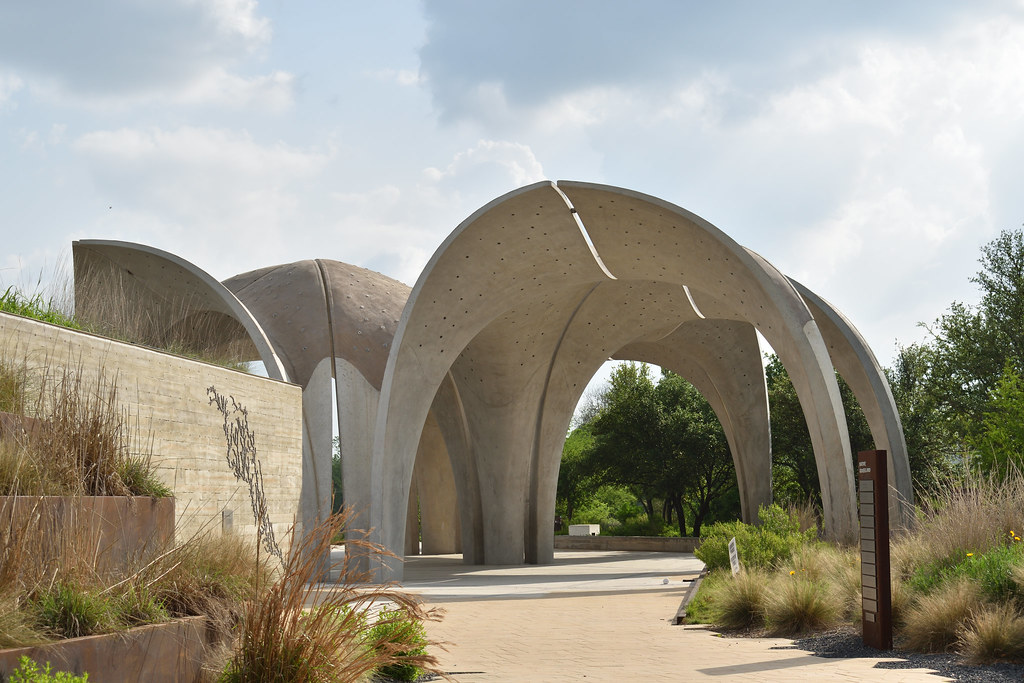
An international celebration took place today at Confluence Park in San Antonio to commemorate the opening of the North American Friendship Garden. The garden is a collaborative effort by the Consulate of Canada in Texas and the Consulate of Mexico in San Antonio together with the City of San Antonio, San Antonio River Authority (River Authority), and San Antonio River Foundation (River Foundation). The public is invited to visit the park to view the garden’s features and learn about the significance of this joint effort.
Located within Confluence Park, an award-winning environmental education park along the banks of the San Antonio River, the pollinator garden is designed to provide a sanctuary for Monarch Butterflies during their international migration, as well as crucial habitat for myriad other pollinators and migratory species. The garden area is approximately 2,500 square feet and includes native grasses, wildflowers, trees, and shrubs. The River Foundation also worked with San Antonio artist Gary Sweeny to create two art benches. Visitors can also view a bug hotel and enjoy locations for thoughtful contemplation and environmental education.
“The Mission Reach of the San Antonio River Walk is a shining example of urban ecosystem restoration that was made possible through the successful collaboration of multiple entities and the North American Friendship Garden is yet another example of the great things that can be accomplished when we all work together for a common goal,” said River Authority General Manager Derek Boese. “We are excited for the public to learn about the important role pollinators play in our environment which we hope will inspire them to become good stewards for our creeks and rivers.”
The idea for the North American Friendship Garden started taking place following the UNESCO designation of San Antonio as a Creative City of Gastronomy, making the city part of UNESCO’s Creative Cities Network. The City of San Antonio World Heritage Office supports this initiative as pollinators play an important role in the food that we consume, and the San Antonio River serves as a corridor for pollinators like the Monarch Butterfly. The garden is in the heart of the important Central Flyway, supporting the iconic Monarch Butterfly as well as other pollinator and migratory species as they travel between Canada and Mexico using San Antonio as a rest stop. In May of 2020, San Antonio was designated a U.S. Pioneer in the recently initiated CitiesWithNature international platform. CitiesWithNature convenes local governments around the world who prioritize nature-based solutions to climate change, recognize ecosystem services, and provide equitable access to nature and the outdoors.
“Working collaboratively, San Antonio partners can be proud of a legacy of conservation and natural resource protection. From the Edwards Aquifer, to the Bracken Cave Preserve, to the Hardberger Park Land Bridge, and now the North American Friendship Garden, we are investing in natural solutions that support our native wildlife,” said Mayor Ron Nirenberg. “I am grateful to our neighbors who are joining us in this effort to ensure a sustainable future for all.”
“The Consulate General of Canada in Texas is proud to have played a role in conceiving and supporting the North American Friendship Garden, a great symbol of the commitment of the people of Canada, Mexico, the United States, and San Antonio to preserve and protect the flyways of the Monarch Butterfly and other pollinators and birds that link all of us throughout North America,” Dr. Rachel McCormick, Consul General of Canada, said.
“For the Government of Mexico, it is crucial to strengthen trilateral cooperation between Canada, the United States, and Mexico. Our three countries are more than just neighbors; we are partners, allies, and, above all, friends,” said Consul General Rubén Minutti Zanatta. “If we continue working together, boosting cooperation, both at the federal, and especially, at the local level, engaging cities, towns, counties, and communities of all kinds, we will ensure the protection of our shared environments, our biodiversity, and wildlife.”
“Confluence Park was created to help educate visitors on our native habitats and the importance of protecting our natural resources for future generations,” said River Foundation Executive Director Frates Seeligson. “We are extremely grateful to our partners and donors for making this garden a reality as it’s a wonderful compliment to the park’s mission and purpose.”
In addition to the international flair surrounding the grand opening of the North American Friendship Garden, Governor Abbott’s Texas Economic Development & Tourism Office provided a ceremonial document to help commemorate this special occasion in San Antonio.
People for our planet
A new dashboard shows just how many people, businesses, cities and countries around the world are speaking up and acting for nature. Compiled by the #VoiceForThePlanet coalition.
